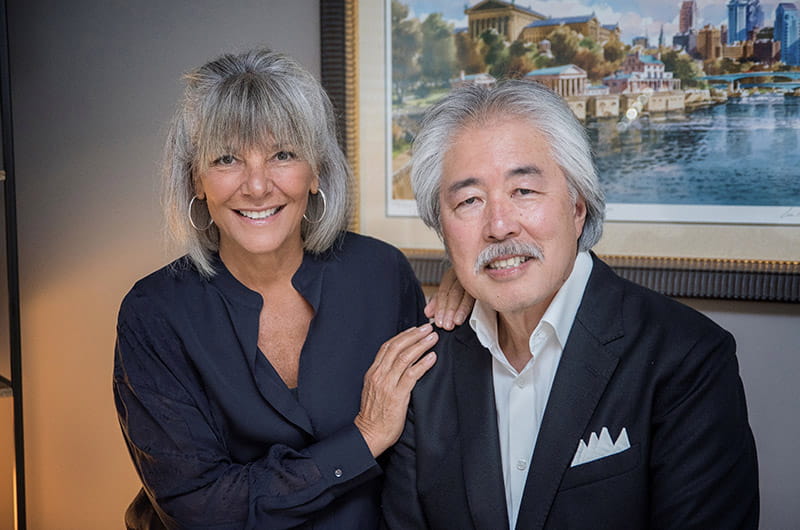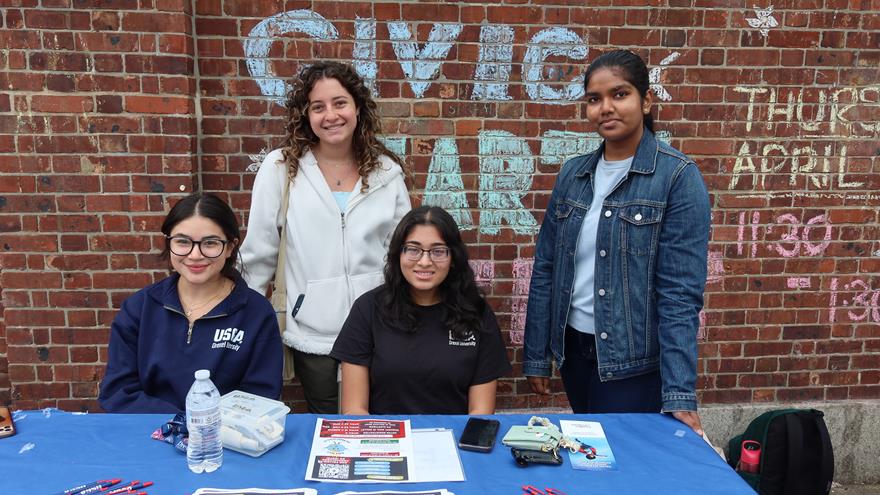Employee Spotlight: The Nezus

Of the 616 Drexel University faculty and professional staff honored for work anniversaries last December, two were married to each other: Distinguished University Professor of Psychology, Arthur (Art) Nezu, PhD, and Professor of Psychology Christine (Chris) Nezu, PhD.
Art and Chris, who both have primary appointments in the College of Arts and Sciences in psychology and additional faculty appointments in the College of Medicine’s Department of Medicine, celebrated 30 years at Drexel last year — and 36-plus years of marriage. They met while working together on a grant project at Fairleigh Dickinson University, started dating a few years later, married in 1983 and moved to Philadelphia to work at Hahnemann University in 1989. Though their areas of research, administrative responsibilities and employers have changed throughout the decades, their collaboration and partnership on and off campus remains the same.
“It’s actually very exciting because we’ve seen so many positive changes over the last three decades, and the 30 years has gone fast,” said Chris. “Looking back, we just see how many wonderful things have happened both professionally and personally in Philadelphia and at Drexel.”
Art was recruited to develop Hahnemann’s psychology PhD program and later became chair of the department, and Chris was recruited to develop a freestanding psychology internship residency program at Hahnemann University Hospital. In the ’90s, they had front row seats when Hahnemann merged with the Medical College of Pennsylvania in 1996, was taken over by Tenet Healthcare Corporation in 1998 and ultimately merged with Drexel University in 2002, thus creating the College of Medicine, Dornsife School of Public Health and the College of Nursing and Health Professions. During all of that, Art was a department chair and then the senior associate dean for research, and Chris was associate provost for research in the provost’s office. After those administrative responsibilities, they decided that they both wanted to get back to their clinical research, teaching and clinical mentorship for a fresh start after their integration into the University.
“Drexel is very fertile in terms of collaboration and willingness to support faculty and faculty research,” Art said. “I think that over the past decade, especially, when President John Fry became president [in 2011], the University has had a tremendous amount of growth both in depth and breadth. It’s been exciting to have been a part of that.”
Today, Art and Chris teach in the College of Arts and Sciences’ Department of Psychology and run a clinical research lab (the Nezu Stress and Coping Lab) and a skill-based training project for U.S. veterans (Nezu New Beginnings). They have recently received funding for an additional project from the Infinite Hero Foundation that will facilitate dissemination of the evidence-based psychotherapy intervention (Emotion-Centered Problem-Solving Therapy, or EC-PST) they developed over the past few decades. Their current focus is on veterans, especially those with post-deployment difficulties and suicide risk. But that wasn’t always the case. And they’re already looking to expand their research and develop clinical programs for the prevention and treatment of suicidality in the general population, including college students.
“As you can imagine, life throws you a curveball, but the notion is that throughout all the past 30-plus years we have changed research focuses a lot,” said Art. “Maybe it’s because Chris and I tend to be excited about something new and we go, ‘Uh oh.’”
At first, they were focused on the coping and adjustment of depression and anxiety in patients in medical fields, including oncology and heart failure. Later, they ran two clinics related to the treatment of sex offenders (those who were intellectually disabled and/or were convicted of or at risk for sex offense) and people with unexplained medical symptoms, like fibromyalgia and non-cardiac chest pain. Over the past 10-plus years, they’ve worked with veteran and active military populations through partnerships with the Department of Veterans Affairs, the Department of Defense and the U.S. Air Force.
“We don’t like to sit in an ivory tower and develop interventions for a select group of people,” said Chris. “We try to take on difficult real-life problems for people who are historically underserved. We roll up our sleeves for the interventions that we do for those underserved populations while training others to carry on the work.”
They both say that the one consistency has been the creation and evolution of an evidence-based treatment they call Emotion-Centered Problem-Solving Therapy (ECPST), which they have adapted toward the different populations they work with. They recently published a book for professionals and a book for the lay public describing this intervention.
These scientist-practitioners both have strengths that they have continually brought to their collegial and professional partnership. Art teaches research methodologies, research design and ethics, and Chris teaches the core clinical courses of the theories that underlie interventions and how to formulate clinical casework — and those areas correlate to their expertise and interests in their collaborations.
“One of the things that often happens is when people meet us for the first time, they ask us how it all works,” said Art. “Like, ‘You guys work together and don’t you get angry at each other or frustrated? Do you talk about your work during dinner?’ And then our answer usually is, ‘Haven’t you ever seen a place where it’s a family restaurant or a plumbing service?’ Not that any of our kids do this with us — we have encouraged and supported them to follow their own dreams.”
Their partnership facilitates their ability to multitask and get things done probably at a faster pace — if they need to work on a presentation on a Sunday, for example, it’s pretty easy to schedule. And working collaboratively with a colleague on a research team is commonplace in a university setting, though the marriage may not be.
“It’s an advantage, but there were also times where people make assumptions about us because we’re together,” said Chris. “We’ve disagreed, we’ve voted differently, we’ve had different kinds of opinions about things — all in a collegial way, the way we would with anybody else on faculty. So anytime throughout our professional careers where Art was involved in something that I might have some kind of influence or decision-making power or vice versa, we made sure it was very clear where the lines and boundaries were drawn. But sometimes that perception is there, and we have had to work very hard to make sure that we didn’t live out that perception.”
Ultimately, their academic family at Drexel has been enormously beneficial for them — and has benefited both Professors Nezu.
“For graduate students who are early career professionals, they often are concerned with how to balance personal and professional life. They are curious about how having a life partner, regardless of whether it’s in the same field or not, can manage. And I think that we’ve been helpful in providing advice to them,” said Art.
That’s just part of the reason why both feel grateful to have careers together at a nurturing environment like Drexel.
This story was published in the winter 2020 issue of Drexel Quarterly.In This Article
Drexel News is produced by
University Marketing and Communications.

